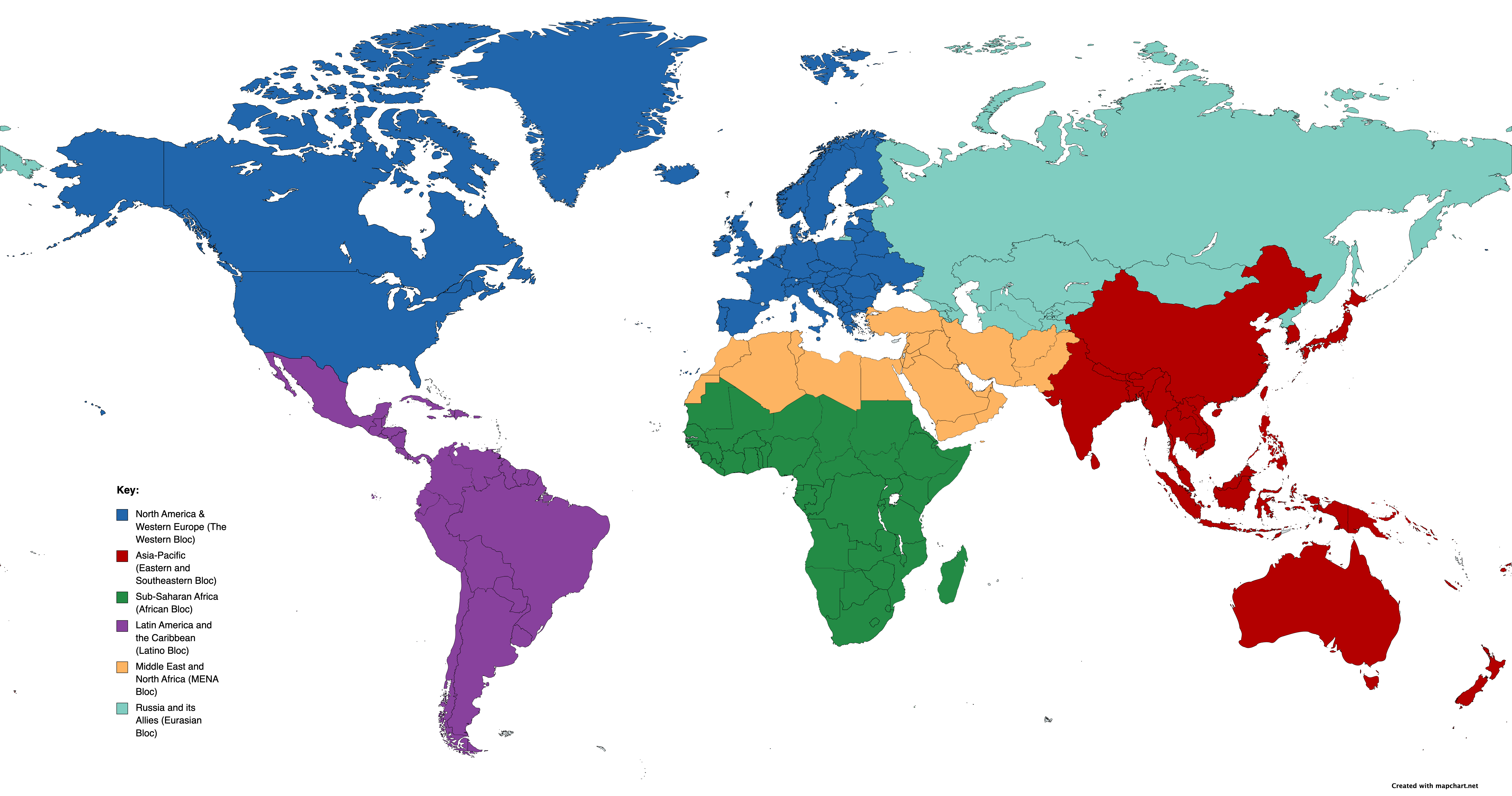Introduction
The world is vast, diverse, and brimming with opportunities for entrepreneurs. By examining six political groupings, we can uncover unique entrepreneurial prospects tailored to each region’s strengths, culture, and needs. Let’s embark on this global journey!
Six Political Groups: A Review
These are broad groupings.
- North America & Western Europe (The Western Bloc):
- Population: Over 800 million.
- Land Mass: Approximately 19,123,457 km².
- Language: Predominantly English, French, German, Spanish, and Italian.
- Business Culture: Formal, structured, and driven by innovation. Emphasis on punctuality, clear communication, and contractual agreements.
- Trade Opportunities:
- Green Tech: With a strong focus on sustainability, there’s a growing demand for green technologies, renewable energy solutions, and sustainable products.
- Digital Health: Aging populations in Europe require advanced healthcare solutions, making telemedicine and health tech startups particularly promising.
- Locations:
- Silicon Valley (USA) for tech startups.
- Berlin (Germany) for its vibrant startup ecosystem.
- Potential Customers:
- Environmentally-conscious consumers.
- Elderly populations seeking healthcare solutions.
- Russia and its Allies (Eurasian Bloc):
- Population: Over 250 million.
- Land Mass: Over 17 million km² (Russia alone).
- Language: Russian and related languages.
- Business Culture: Hierarchical with a mix of Western and Eastern influences. Personal relationships and trust are crucial.
- Trade Opportunities:
- Energy Resources: Russia is one of the world’s largest producers of oil and natural gas. The country has vast reserves, making the energy sector a dominant player in its exports.
- Minerals and Metals: The Eurasian Bloc, particularly Russia, is rich in minerals like gold, diamonds, coal, and rare earth metals. Kazakhstan is a significant producer of uranium.
- Asia-Pacific (Eastern and Southeastern Bloc):
- Population: Over 4 billion.
- Land Mass: Approximately 35,514,500 km².
- Language: Mandarin, Hindi, Japanese, Korean, Bahasa Indonesia, among others.
- Business Culture: Diverse, with a blend of tradition and modernity. Respect for hierarchy, emphasis on relationships, and face-saving are common traits.
- Trade Opportunities:
- E-commerce: With the digital boom in countries like China, e-commerce platforms and solutions have immense potential.
- Robotics: Japan’s expertise in robotics can be leveraged for sectors like healthcare, entertainment, and manufacturing.
- Locations:
- Shenzhen (China) for electronics and manufacturing.
- Tokyo (Japan) for robotics and tech innovations.
- Potential Customers:
- Young, tech-savvy populations.
- Industries seeking automation solutions.
- Middle East and North Africa (MENA Bloc):
- Population: Over 400 million.
- Land Mass: Approximately 15 million km².
- Language: Primarily Arabic, with variations across countries.
- Business Culture: Relationship-driven with a high regard for tradition. Hospitality and face-to-face meetings are valued.
- Trade Opportunities:
- Renewable Energy: Moving away from oil, there’s potential in solar and wind energy ventures.
- Cultural Tourism: The ancient Silk Road and historical sites offer unique tourism opportunities.
- Locations:
- Dubai (UAE) for its business-friendly environment.
- Samarkand (Uzbekistan) for tourism centered around historical sites.
- Potential Customers:
- Global industries seeking renewable energy solutions.
- History buffs and travelers.
- Sub-Saharan Africa (African Bloc):
- Population: Over 1 billion.
- Land Mass: Approximately 7,769,477 km².
- Language: A vast array, including Swahili, Hausa, Yoruba, Zulu, and English.
- Business Culture: Diverse across countries, but generally relationship-driven with a mix of traditional and Western influences.
- Trade Opportunities:
- Fintech: With a significant unbanked population, mobile money and fintech solutions can thrive.
- Eco-tourism: Africa’s rich biodiversity offers opportunities for sustainable tourism ventures.
- Locations:
- Nairobi (Kenya) for its growing tech hub.
- Cape Town (South Africa) for tourism ventures.
- Potential Customers:
- Local populations seeking banking alternatives.
- International tourists.
- Latin America and the Caribbean (Latino Bloc):
- Population: Over 600 million.
- Land Mass: Approximately 15,459,746 km².
- Language: Primarily Spanish and Portuguese.
- Business Culture: Relationship-centric with a relaxed approach to time. Family and personal connections play a significant role.
- Trade Opportunities:
- Agri-business: With vast arable lands, businesses can explore organic farming, coffee cultivation, and more.
- Cultural Tourism: The rich heritage and festivals can be leveraged for tourism.
- Locations:
- São Paulo (Brazil) for agri-business ventures.
- Mexico City (Mexico) for cultural enterprises.
- Potential Customers:
- Global consumers of agricultural products.
- Culture enthusiasts and travelers.
In conclusion, each political grouping presents a unique blend of culture, resources, and opportunities. Understanding the nuances of each region is crucial for businesses looking to expand globally. From the tech hubs of the Western Bloc to the vast natural resources of the African and Eurasian Blocs, the world offers a plethora of trade and investment opportunities for the discerning entrepreneur.
Global Venture Quest – Classroom Game
Objective: To educate university students about the six political groupings and the entrepreneurial opportunities they offer, while also teaching them the basics of starting and running a successful business.
Setup:
- A game board depicting a world map divided into the six political groupings. Download from here.
- Opportunity cards specific to each region, detailing potential business ideas. See below.
- Challenge cards that present obstacles or advantages based on real-world scenarios. See below.
- Venture tokens representing different business resources: capital, manpower, technology, etc.
- Player tokens to move around the board.
How to Play:
- Starting Out:
- Each player selects a token and starts at desire country.
- Players are given a set number of venture tokens to start their entrepreneurial journey.
- Moving Around:
- Players roll a dice to move around the board. Landing on a region allows them to draw an ‘Opportunity Card’ specific to that region.
- The Opportunity Card will present a business idea related to that region’s strengths (e.g., Green Tech in Europe or Agri-tech in South Asia).
- Investing in Opportunities:
- To invest in an opportunity, players spend their venture tokens. Different opportunities will require different combinations of resources.
- Once invested, players receive a ‘Business Card’ for that opportunity, which they keep for the game’s duration.
- Facing Challenges:
- As players move around the board, they may land on ‘Challenge Spaces’. Here, they draw a ‘Challenge Card’ which may present obstacles (e.g., political instability, economic downturn) or advantages (e.g., a tech boom, favorable trade policies).
- Challenges can affect the success of their businesses, requiring them to adapt or pivot.
- Expanding and Collaborating:
- Players can expand their businesses by investing in new opportunities in different regions.
- Players can also collaborate, merging resources to tackle bigger opportunities or challenges.
- Winning the Game:
- The game ends when all Opportunity Cards have been drawn.
- Players calculate their success based on the number of businesses they’ve started, minus any challenges they couldn’t overcome.
- The player with the most successful ventures across the different regions wins, showcasing their global entrepreneurial prowess.
Educational Value:
- Players learn about the unique entrepreneurial opportunities in each political grouping.
- They understand the challenges of starting and running a business in different global contexts.
- Collaboration and strategy are key, teaching players the value of partnerships and adaptability.
Expansion Ideas:
- Introduce ‘Tech Upgrade’ cards that allow businesses to adopt new technologies, reflecting the real-world importance of tech in entrepreneurship.
- ‘Cultural Insight’ cards can provide players with knowledge about local customs and practices, emphasizing the importance of cultural understanding in global business.
“Global Venture Quest” is not just a game but an interactive learning experience, making the complexities of global entrepreneurship accessible and engaging for university students.
Opportunity Cards for Each region
These “Opportunity Cards” are designed to reflect the unique strengths and potential of each region. Players can use them to strategize their moves and investments, making the game both educational and engaging. Each bullet point below is on a separate card.
1. North America & Western Europe (The Western Bloc):
- Green Tech Revolution: Invest in a startup focusing on sustainable energy solutions.
- Digital Health Innovations: Launch a telemedicine platform catering to the aging population.
- Luxury Brand Expansion: Open a luxury fashion boutique in a prime European city.
- Automotive Tech: Develop autonomous driving software in collaboration with leading car manufacturers.
- Fintech Innovations: Create a digital banking platform targeting millennials.
2. Russia and its Allies (Eurasian Bloc):
- Energy Exploration: Secure a contract for oil and gas exploration in Siberia.
- Mineral Mining Venture: Start a mining operation focusing on rare earth metals.
- Agricultural Expansion: Invest in large-scale wheat and barley farming.
- Defense Tech Partnership: Collaborate with a defense firm to upgrade military equipment.
- Tourism Boost: Establish a luxury resort near historical Russian landmarks.
3. Asia-Pacific (Eastern and Southeastern Bloc):
- E-commerce Platform: Launch an e-commerce site catering to the rising middle class.
- Robotics Startup: Develop robots for elderly care, especially in Japan.
- Textile Factory: Open a sustainable textile production unit in Southeast Asia.
- IT Outsourcing Hub: Establish an IT consulting firm in India’s tech cities.
- Seafood Export Business: Start a seafood export company in the Pacific region.
4. Middle East and North Africa (MENA Bloc):
- Solar Energy Park: Invest in a large-scale solar energy project in a desert region.
- Cultural Tourism: Set up a travel agency focusing on historical and cultural tours.
- Petrochemical Plant: Establish a petrochemical processing plant near oil reserves.
- Luxury Real Estate: Develop luxury resorts in coastal areas targeting international tourists.
- Desalination Project: Start a water desalination plant to address water scarcity.
5. Sub-Saharan Africa (African Bloc):
- Mobile Banking App: Launch a fintech solution for the unbanked population.
- Eco-tourism Venture: Establish an eco-friendly safari resort in a wildlife-rich region.
- Agricultural Tech: Introduce modern farming techniques to boost crop yields.
- Artisanal Marketplace: Create an online platform for African artisans to sell crafts globally.
- Renewable Energy Project: Invest in wind or hydroelectric power projects.
6. Latin America and the Caribbean (Latino Bloc):
- Coffee Export Business: Start a specialty coffee export business from Brazil or Colombia.
- Cultural Festival: Organize a pan-Latin music and arts festival attracting global tourists.
- Eco-friendly Resorts: Develop sustainable beach resorts in the Caribbean.
- Tech Hub: Establish a tech startup incubator in a major Latin city.
- Agri-business: Invest in organic farming, focusing on fruits and vegetables for export.
Challenge Cards
These “Challenge Cards” are designed to simulate real-world scenarios that global entrepreneurs might face. They add an element of unpredictability to the game, requiring players to adapt, strategize, and make decisions based on changing circumstances.
1. North America & Western Europe (The Western Bloc):
- Regulatory Hurdles: New EU regulations impact your business. Adjust your strategy.
- Economic Downturn: Recession hits. Reduce your investments for two turns.
- Brexit Implications: Trade barriers arise. Pause any UK-based ventures for a turn.
- Tech Boom: A surge in tech investments. Double your tech-related ventures’ returns for three turns.
- Labor Strikes: Operations halt in your factories. Lose a turn.
2. Russia and its Allies (Eurasian Bloc):
- Sanctions Imposed: Western sanctions affect your exports. Lose 20% of your venture tokens.
- Gas Pipeline Deal: Secure a major energy contract. Gain extra venture tokens.
- Political Instability: Protests disrupt business. Pause your ventures for a turn.
- Arctic Opportunity: Discover new oil reserves. Boost energy-related ventures.
- Cybersecurity Threat: Your IT ventures face cyber-attacks. Invest in security or lose a turn.
3. Asia-Pacific (Eastern and Southeastern Bloc):
- Trade War: Tariffs impact your exports. Reduce your investments for two turns.
- Digital Revolution: E-commerce booms. Double returns on digital ventures for three turns.
- Natural Disaster: A tsunami affects your coastal ventures. Lose a turn for recovery.
- Manufacturing Surge: Production costs drop. Boost your manufacturing ventures.
- Border Tensions: Political tensions affect trade. Pause any ventures involving affected countries.
4. Middle East and North Africa (MENA Bloc):
- Oil Price Crash: Global oil prices plummet. Energy ventures yield lower returns.
- Historical Site Discovery: Tourism booms in a region. Boost your tourism ventures.
- Political Unrest: Instability affects business. Pause your ventures for a turn.
- Green Energy Shift: Solar energy demand rises. Boost your renewable energy ventures.
- Water Crisis: Water scarcity affects agriculture. Invest in solutions or face reduced returns.
5. Sub-Saharan Africa (African Bloc):
- Infrastructure Challenges: Poor infrastructure affects logistics. Lose a turn.
- Mobile Tech Boom: Mobile technology adoption surges. Double returns on tech ventures.
- Drought Conditions: Agriculture is affected. Invest in irrigation or face reduced returns.
- Emerging Market: A country’s economy booms. Boost your ventures in that region.
- Health Crisis: An outbreak affects operations. Pause your ventures for a turn.
6. Latin America and the Caribbean (Latino Bloc):
- Currency Devaluation: A country’s currency crashes. Reduce your investments for two turns.
- Carnival Boom: A major festival boosts tourism. Gain extra venture tokens.
- Political Change: A new government affects trade policies. Adjust your strategy.
- Rainforest Opportunity: Sustainable ventures in the Amazon gain traction. Boost eco-related ventures.
- Natural Resource Discovery: Discover a major mineral reserve. Boost related ventures.
Venture tokens
Players start with a set number of each token and can acquire more as they progress in the game. The strategic use of these tokens, based on the opportunities and challenges faced, will determine the success of their ventures and their overall standing in the game.
1. Capital Token (💰):
- Description: Represents financial resources available for investment.
- Use: Essential for starting any venture. Players can acquire more through successful ventures or trade with other players.
2. Technology Token (🔧):
- Description: Symbolizes technological assets and innovations.
- Use: Crucial for tech-related ventures or to upgrade existing businesses. Can also be used to counteract certain challenges, like cybersecurity threats.
3. Manpower Token (👥):
- Description: Represents skilled labor and human resources.
- Use: Needed for ventures that require significant manpower, such as manufacturing units or service industries.
4. Infrastructure Token (🏗️):
- Description: Denotes physical infrastructure like factories, offices, or logistics networks.
- Use: Essential for establishing physical businesses or expanding existing ones.
5. Market Access Token (🌐):
- Description: Symbolizes access to new markets or consumer bases.
- Use: Vital for expanding ventures into new regions or tapping into larger consumer demographics.
6. Research & Development Token (🔍):
- Description: Represents investment in research, innovation, and product development.
- Use: Crucial for ventures in sectors like pharmaceuticals, tech, or any field requiring innovation.
7. Branding & Marketing Token (📢):
- Description: Denotes branding, marketing, and promotional assets.
- Use: Essential for ventures that rely heavily on consumer awareness, branding, or market presence.
8. Sustainability Token (🌿):
- Description: Symbolizes sustainable practices and green technologies.
- Use: Vital for eco-friendly ventures or to upgrade existing businesses to be more sustainable.
9. Legal & Compliance Token (⚖️):
- Description: Represents legal assets, patents, and compliance certifications.
- Use: Crucial for navigating regulatory challenges or securing intellectual property rights.
10. Partnership & Alliance Token (🤝):
- Description: Denotes strategic partnerships, alliances, or mergers.
- Use: Can be used to collaborate with other players, merge resources, or tackle bigger opportunities and challenges.
Summary
“Global Venture Quest” is an interactive board game designed to immerse university students in the world of global entrepreneurship. Players navigate six political groupings, seizing unique business opportunities while tackling region-specific challenges. Using “Venture Tokens” representing various business resources, players strategize, invest, and collaborate to establish successful ventures across the globe. From the tech hubs of the Western Bloc to the resource-rich landscapes of the African Bloc, players experience the complexities and rewards of international business.
Learning Outcomes:
- Global Business Acumen:
- Gain insights into the diverse entrepreneurial opportunities present in different political groupings.
- Understand the nuances of doing business in various regions, from regulatory challenges to cultural considerations.
- Strategic Thinking & Decision Making:
- Develop the ability to strategize based on available resources, market conditions, and potential risks.
- Make informed decisions on where and how to invest, ensuring the best possible returns.
- Resource Management:
- Learn the importance of effectively managing and allocating resources, from capital and technology to manpower and market access.
- Understand the value of sustainability in business, utilizing green practices and technologies.
- Collaboration & Negotiation:
- Experience the benefits of forming strategic partnerships and alliances.
- Hone negotiation skills, collaborating with peers to tackle bigger challenges or seize larger opportunities.
- Risk Assessment & Problem Solving:
- Evaluate potential risks associated with various business ventures and geopolitical scenarios.
- Develop problem-solving skills, navigating challenges, and pivoting strategies when necessary.
- Cultural Competency:
- Gain a deeper appreciation for the diverse business cultures across the globe.
- Understand the significance of cultural nuances, from communication styles to decision-making processes.
- Real-world Application:
- Relate game scenarios to real-world business situations, preparing for actual challenges in the global market.
- Recognize the importance of staying updated with global trends, geopolitical shifts, and emerging markets.
In conclusion, “Global Venture Quest” offers university students a dynamic learning experience, bridging classroom theory with practical insights into global entrepreneurship. Through gameplay, students not only enhance their business acumen but also develop essential skills that will serve them well in their future careers.




